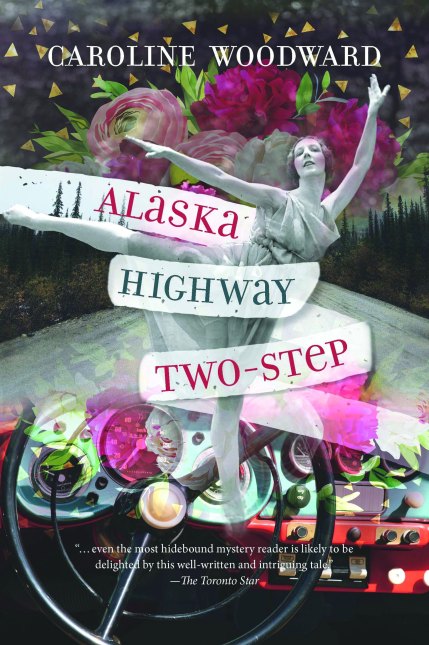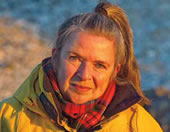Caroline Woodward re-releases Alaska Highway Two-Step
It’s not often these days a novel gets a second chance at life. Author Caroline Woodward’s first novel, Alaska Highway Two-Step, will get just that, with a new edition being released this month by Harbour Publishing.Woodward’s novel tells the story of a freelance journalist, a young woman living in the Kootenays, who accepts an assignment to write a series of articles about life along the Alaska Highway. To those of us who know Caroline it’s clear her main character, Mercy Brown, is based at least partly on her own personality. But with a twist: Brown has the uncanny gift of precognition, the ability to foresee real life events in dreams. The novel weaves three narrative strands into the plot: Brown’s road trip north, her disturbing premonitions, and excerpts from journals she inherited from a deceased aunt – a ballet dancer and choreographer in the early decades of the 20th century. It’s an interesting juxtaposition of the lives of two different generations of professional women. Expect to be surprised: this story focuses more on grain and texture than on following the plot points of a typical mystery novel. Caroline agreed to be interviewed about the new edition of her novel.

The beautiful new cover for Alaska Highway Two-Step from Harbour Publishing.
I don’t recall the book being promoted as a mystery when it originally came out in 1993. What genre description best fits the book for you? It is indeed a mystery novel for adults and was nominated by the Crime Writers of Canada for the Arthur Ellis (Canada’s last hangman) Best First Mystery Novel Award. Margaret Cannon, who still writes a weekly mystery reviews column for the Globe & Mail and does regular broadcasts for CBC Radio, picked it for the Globe & Mail Editor’s Pick of Top 100 Books in 1993. I was also invited to the 1994 Bouchercon International Mystery Convention in Seattle in 1994 to be part of a panel and to give a reading. It’s just not a typical blood and gore formula murder mystery.
How much of the novel is based on your own experience? We know you are a northern BC gal and have family ties to the Peace River region so how did that inform the writing of the novel? Absolutely none of this novel is based on my own experience except for the idyllic cottage at Five Mile on Kootenay Lake and my dear, departed dog, Sadie Brown whose ashes are now in an urn beneath my writing desk. Certainly my upbringing in the north Peace region, going to school and living in a dormitory for ‘bush kids’ in Fort St. John and later, as an adult, working with First Nations teens informs this novel. The havoc wreaked on the remote village of Fort Ware when Williston Lake, created by the first dam on the Peace River in the 1960s, flooded much of their village and other eyewitness accounts of the drowning of wild animals and nesting birds, and the suicides of trappers and others who lived in the flooded valley are real events and I have included some of them. I invented the Canadian Bureau of Premonitions, as I explain in the Foreword, and made my main character a reluctant psychic. I incorporated the practice of lucid, or more like focused, dreaming, before a crucial hunting trip and other life challenges, including dying, as practiced by people regarded as prophets among the Dane-Zaa people in the Peace and studied by anthropologist Dr. Robin Ridington, author of at least three major books on this subject, his life’s work.

Caroline Woodward
If there’s a novelist whose work you most admire, who would it be? (Can be more than one of course!) And why? Are there ways you find yourself absorbing that (or those) novelist’s techniques? I admire, and read, so many novelists that I honestly cannot pick just one so a random off-the-top list would include Louise Erdrich, Michael Ondaatje, Anne DeGrace, Bodil Bredsdorff, Patrick DeWitt and Anthony Doerr. But Paulette Jiles came to mind immediately, author of novels like Enemy Women, The Colour of Lightning, Lighthouse Island and the most recent gem, News of the World, a finalist for the National Book Award for Fiction in 2016. Paulette’s advice to me early in my career, which I freely pass on to students and writer friends wherever I go, was: Write how you talk. Do not write like a Victorian governess unless you are one. I interpreted this further to mean: listen well to how other people talk. Absorb their rhythms and hesitations, their choice of vocabulary, the words they say and their silences.
What method did you develop to achieve this realism of voice in your stories? Nearly ten years before I met Paulette at David Thompson University Centre in Nelson where I earned a diploma in Creative Writing, I earned my B.A. and Teacher’s Certificate at UBC. For several fourth year courses, I began tape-recording pioneers in the Peace River country: a Red Cross Outpost Hospital nurse, river freighter, immigrant farmers, radio operator in Watson Lake, school teachers, war brides on homesteads and small town radio founders. These tapes are now held in the Royal BC Museum in Victoria and in the North Peace Museum in Fort St. John but they resonated with me when I did the recordings, older people sharing some of the most profound moments of their lives with me and I heard some of those voices when I wrote poetry and again when I heard Paulette’s sage advice. So don’t imitate other writers. Read them to love their stories, their voices, but learn to write in your own authentic voice. It also helps me to have worked in theatre and to have written for radio and stage pieces as that’s all about voice, about someone on a stage or a disembodied voice from the radio or from within a book, a voice calling out to you all by yourself, late at night saying, get comfy, I have a really good story I have to tell you.
Alaska Highway Two-Step will be available through all the usual outlets.